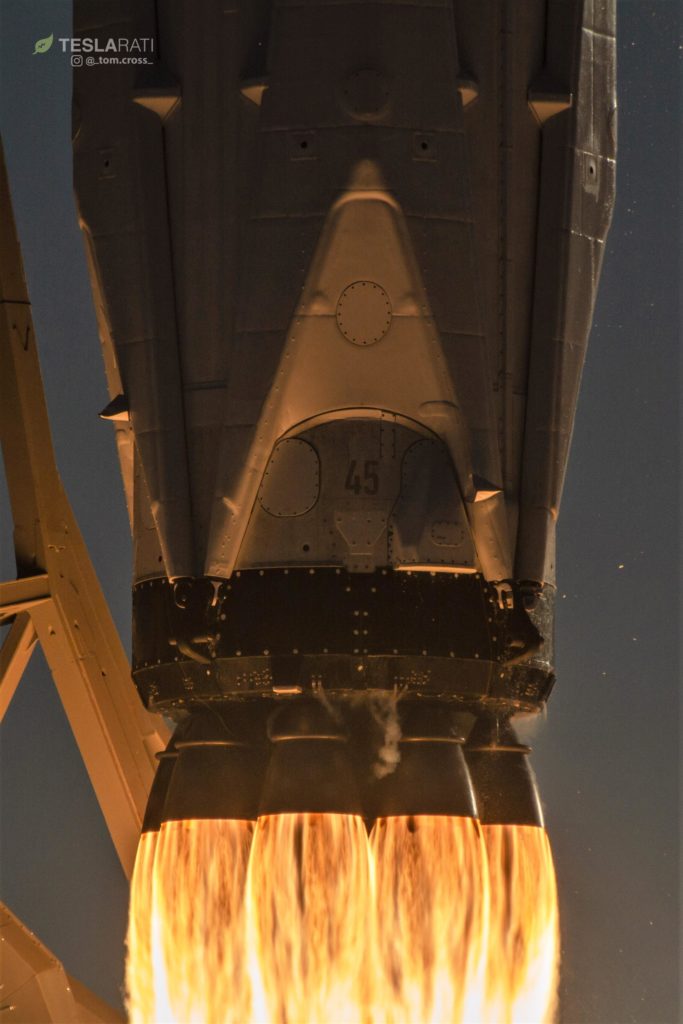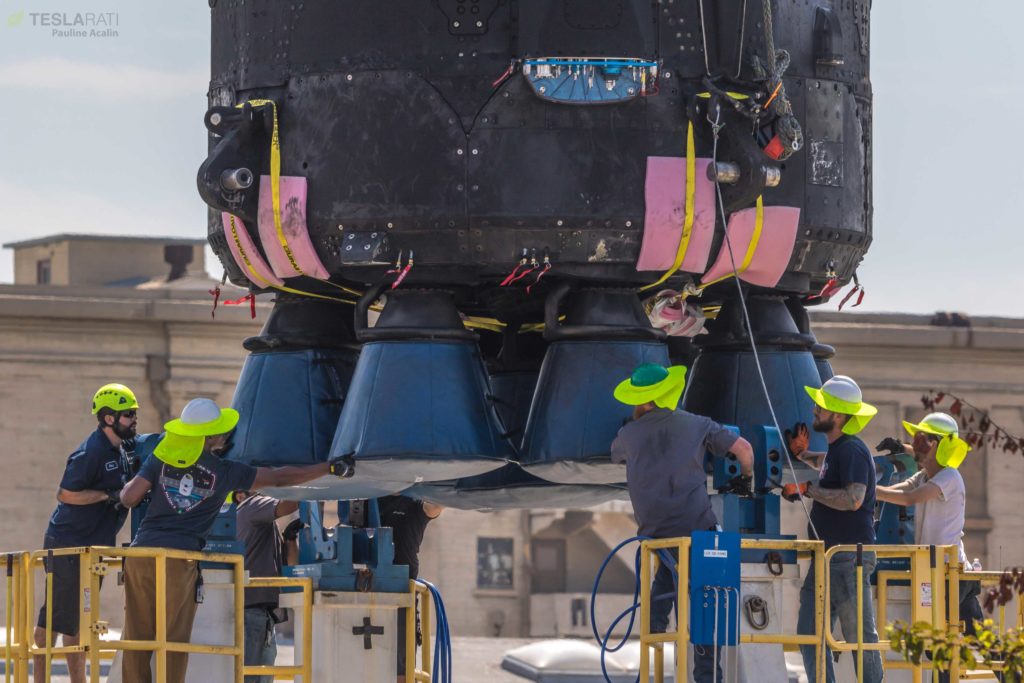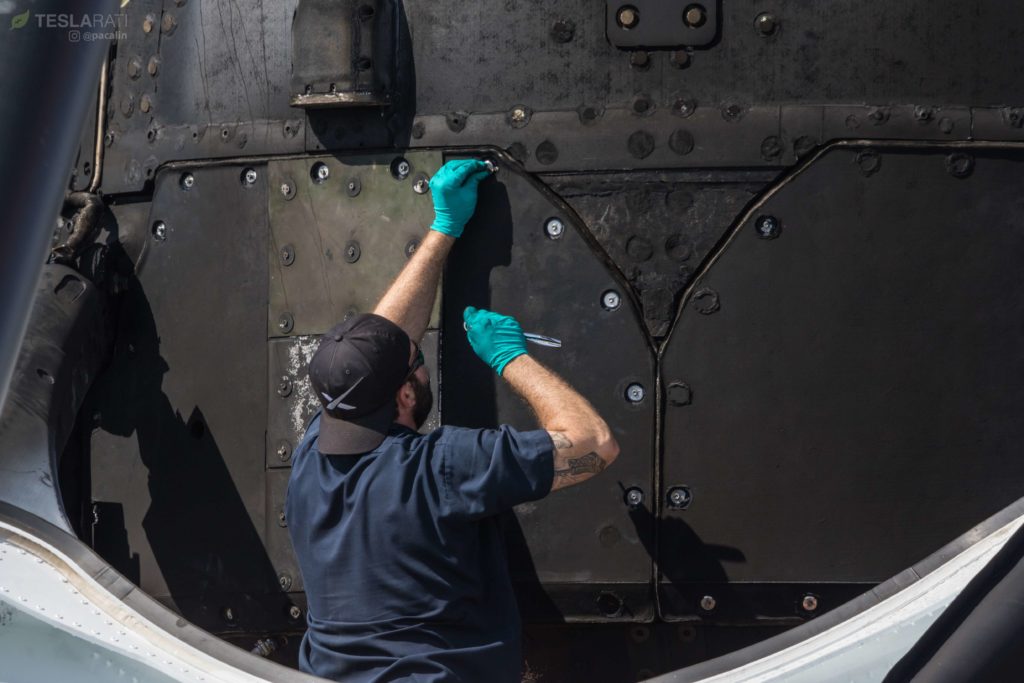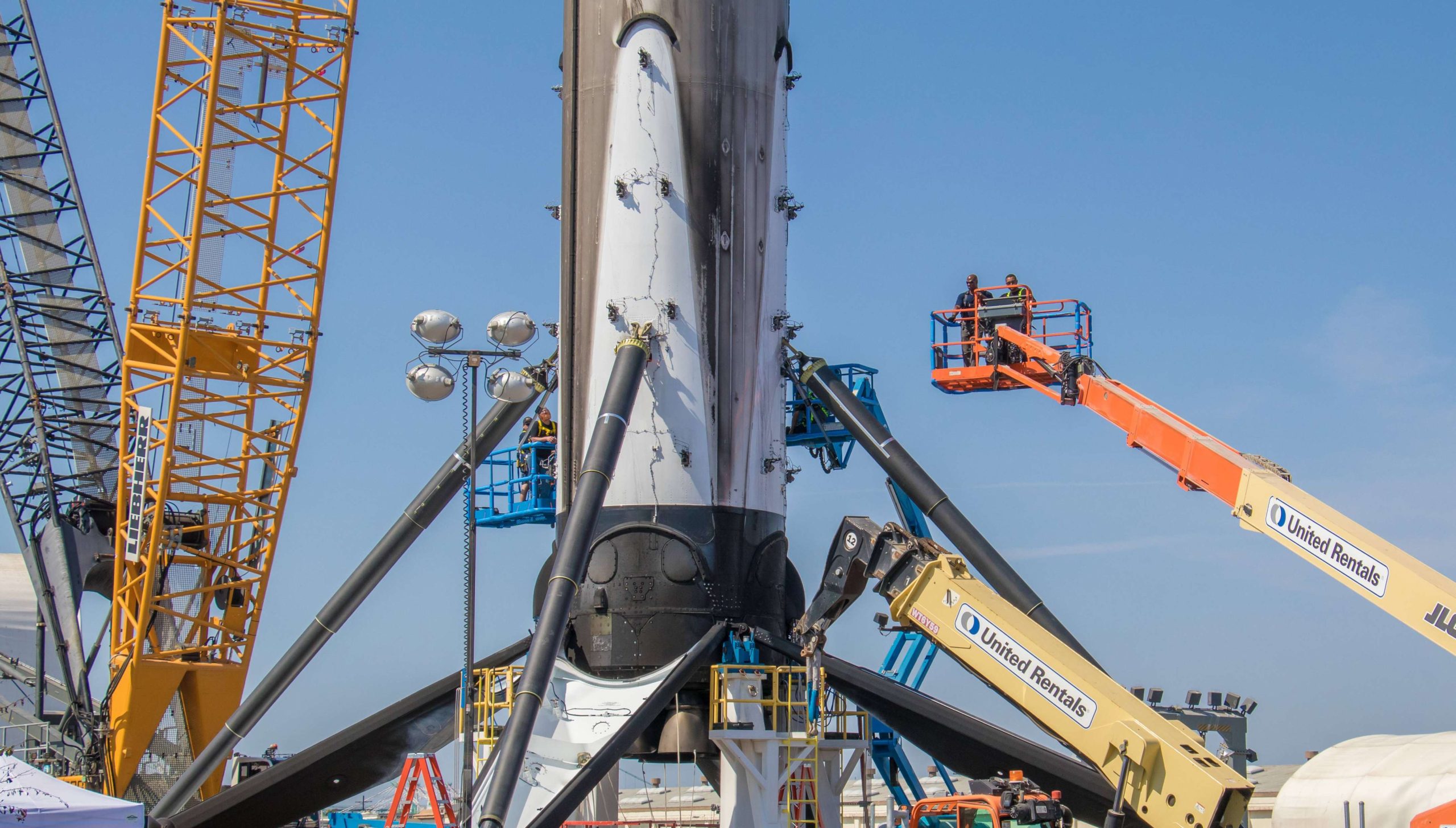
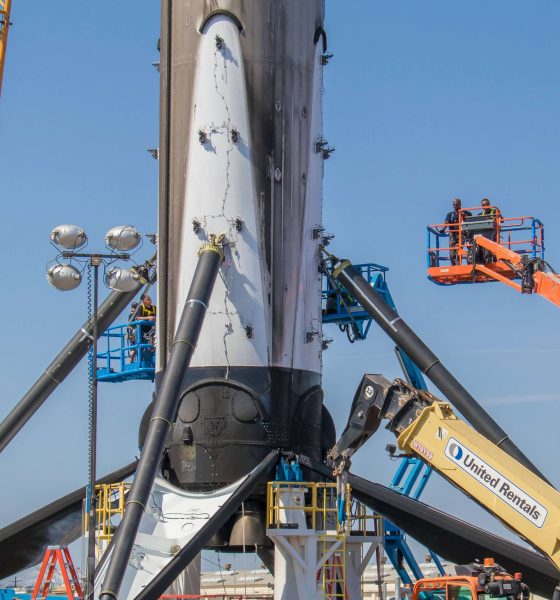
News
SpaceX’s second Falcon 9 Block 5 booster reuse closes in as rocket refurb continues
Scheduled on October 7th, SpaceX is roughly three weeks out from the next routine launch of Falcon 9, set to carry the ~2800 kg (6200 lb) Argentinian satellite SAOCOM-1A into a low polar orbit from the company’s Vandenberg Air Force Base launch facilities.
Cocooned inside Falcon 9’s payload fairing during the final days of August, the Earth observation satellite’s launch will mark a number of exciting milestones for SpaceX, including the second reuse of a Block 5 booster and the debut of a California-based rocket landing zone barely 400m (1400ft) from the launch pad.
Última foto del satélite argentino SAOCOM 1A en Tierra! Los equipos de la CONAE, VENG, @invapargentina y @CNEAok finalizaron la integración y encapsulado del SAOCOM 1A en la cofia del lanzador Falcon 9 de @SpaceX. El satélite está listo! Comienzan preparativos de lanzamiento! pic.twitter.com/pwwj0NYIwE
— CONAE (@CONAE_Oficial) September 14, 2018
Previously tasked with launching Iridium’s 7th group of 10 NEXT satellites on July 25th, Falcon 9 B1048 has been assigned as SAOCOM 1A’s ride to orbit, originally expected to refly as early as September 5th and September 28th. Despite the delays, it still appears that B1048 will easily snag the SpaceX record for second fastest booster turnaround – 74 days compared to Block 5 booster B1045’s 71 days gap between launching NASA’s TESS and CRS-15 missions.
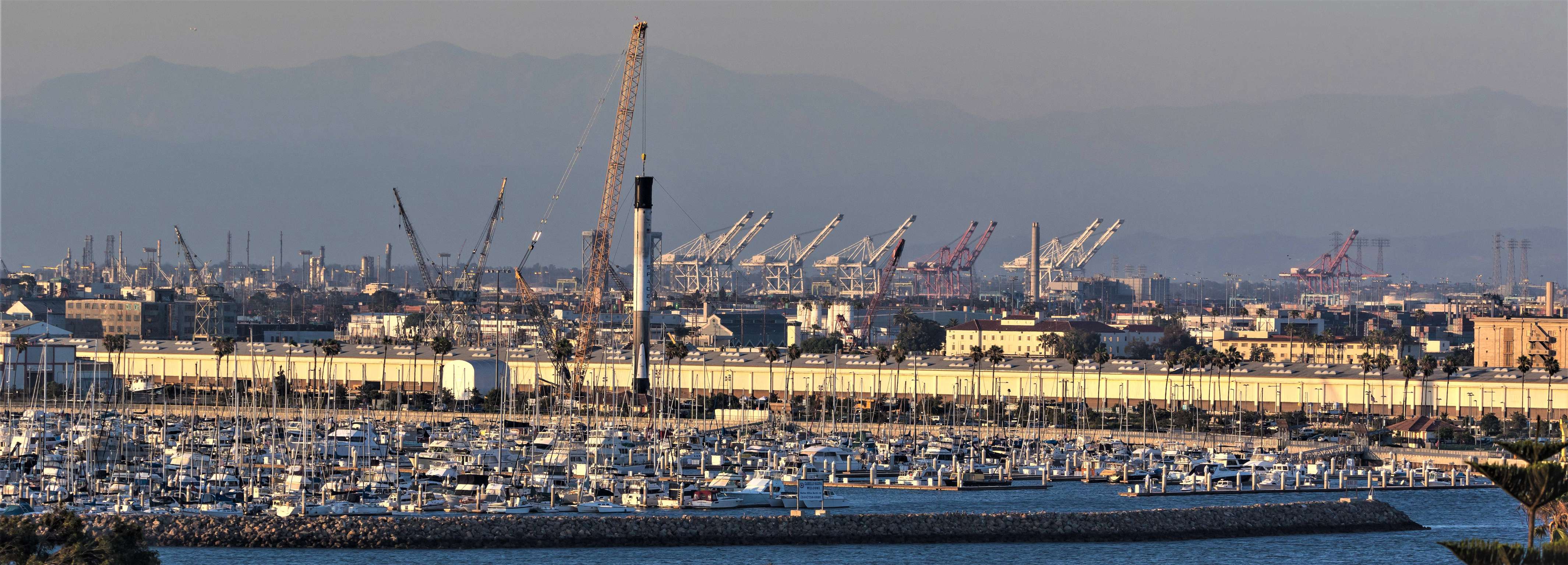
According to a number of comments from satellite engineers involved in the launch, most of the month-long slip rested on rocket availability, meaning that SpaceX was having some sort of difficulty with Falcon 9 components. Given photos and official comments showing that SAOCOM-1A was encapsulated in its payload fairing more than 5 weeks before launch (August 30th) and that Falcon 9 Block 5 is a fairly new launch vehicle, especially in a flight-proven configuration, the most logical explanation is that SpaceX is simply being extra cautious and thorough with B1048’s post-flight analysis and refurbishment.
It’s entirely possible that SpaceX engineers and technicians could have managed a ~40-day turnaround to make the original September 5 launch date, but it’s equally likely that some off-nominal characteristics were noted while the booster was being prepped for transport after craning off of drone ship Just Read The Instructions. In fact, B1048’s recovery operations were exceptionally lengthy and in-depth, including an extraordinary few hours during which technicians removed the booster’s Merlin 1D access panels, baring wholly-uncovered rocket engines in full view of a public area. Nothing equivalent has ever been observed over the course of more than a dozen Falcon booster recoveries, perhaps indicating some unique circumstances in the case of B1048.
- After launching in April 2018, B1045 landed on OCISLY and is being refurbished for a second launch in just 5 days, on June 29. (Tom Cross)
- An excellent look at Block 5 booster B1048’s aft, showing off two of four launch clamp attachment points. (Pauline Acalin)
- SpaceX technicians reinstall Falcon 9 B1048’s Merlin bay covers after examining the interior for several hours. (Pauline Acalin)
- SpaceX’s West Coast landing zone is preparing for its debut, currently NET October 6th 2018. (Pauline Acalin/Teslarati)
The most obvious explanation is that those publicly-visible inspections were used to judge whether the flight-proven booster could return directly to SpaceX’s Vandenberg launch pad or needed to make a stop at the company’s dedicated Hawthorne factory and refurbishment facilities. Judging from the month-long slip that transpired, it’s probable that the latter option was selected. Regardless, caution is key when a customer’s payload is on the line.
Once it makes its way to the launch pad for the second time, B1048 will have the opportunity to both become the first Block 5 booster to land on land and the first rocket ever to land at SpaceX’s West Coast Landing Zone (LZ), under construction/development for the last two or so years. Just like its Floridan twins, the California LZ will only be an option for particularly lightweight payloads and lower-energy launch profiles, of which SAOCOM 1A (and 1B) certainly fit the bill.
For prompt updates, on-the-ground perspectives, and unique glimpses of SpaceX’s rocket recovery fleet check out our brand new LaunchPad and LandingZone newsletters!

News
Tesla wins another award critics will absolutely despise
Tesla earned an overall score of 49 percent, up 6 percentage points from the previous year, widening its lead over second-place Ford (45 percent, up 2 points) to a commanding 4-percentage-point gap. The company also excelled in the Fossil Free & Environment category with a 50 percent score, reflecting strong progress in reducing emissions and decarbonizing operations.

Tesla just won another award that critics will absolutely despise, as it has been recognized once again as the company with the most sustainable supply chain.
Tesla has once again proven its critics wrong, securing the number one spot on the 2026 Lead the Charge Auto Supply Chain Leaderboard for the second consecutive year, Lead the Charge rankings show.
NEWS: Tesla ranked 1st on supply chain sustainability in the 2026 Lead the Charge auto/EV supply chain scorecard.
“@Tesla remains the top performing automaker of the Leaderboard for the second year running, and increased its overall score by 6 percentage points, while Ford only… pic.twitter.com/nAgGOIrGFS
— Sawyer Merritt (@SawyerMerritt) March 4, 2026
This independent ranking, produced by a coalition of environmental, human rights, and investor groups including the Sierra Club, Transport & Environment, and others, evaluates 18 major automakers on their efforts to build equitable, sustainable, and fossil-free supply chains for electric vehicles.
Tesla earned an overall score of 49 percent, up 6 percentage points from the previous year, widening its lead over second-place Ford (45 percent, up 2 points) to a commanding 4-percentage-point gap. The company also excelled in the Fossil Free & Environment category with a 50 percent score, reflecting strong progress in reducing emissions and decarbonizing operations.
Perhaps the most impressive achievement came in the batteries subsection, where Tesla posted a massive +20-point jump to reach 51 percent, becoming the first automaker ever to surpass 50 percent in this critical area.
Tesla achieved this milestone through transparency, fully disclosing Scope 3 emissions breakdowns for battery cell production and key materials like lithium, nickel, cobalt, and graphite.
The company also requires suppliers to conduct due diligence aligned with OECD guidelines on responsible sourcing, which it has mentioned in past Impact Reports.
While Tesla leads comfortably in climate and environmental performance, it scores 48 percent in human rights and responsible sourcing, slightly behind Ford’s 49 percent.
The company made notable gains in workers’ rights remedies, but has room to improve on issues like Indigenous Peoples’ rights.
Overall, the leaderboard highlights that a core group of leaders, Tesla, Ford, Volvo, Mercedes, and Volkswagen, are advancing twice as fast as their peers, proving that cleaner, more ethical EV supply chains are not just possible but already underway.
For Tesla detractors who claim EVs aren’t truly green or that the company cuts corners, this recognition from sustainability-focused NGOs delivers a powerful rebuttal.
Tesla’s vertical integration, direct supplier contracts, low-carbon material agreements (like its North American aluminum deal with emissions under 2kg CO₂e per kg), and raw materials reporting continue to set the industry standard.
As the world races toward electrification, Tesla isn’t just building cars; it’s building a more responsible future.
News
Tesla Full Self-Driving likely to expand to yet another Asian country
“We are aiming for implementation in 2026. [We are] doing everything in our power [to achieve this],” Richi Hashimoto, president of Tesla’s Japanese subsidiary, said.

Tesla Full Self-Driving is likely to expand to yet another Asian country, as one country seems primed for the suite to head to it for the first time.
The launch of Full Self-Driving in yet another country this year would be a major breakthrough for Tesla as it continues to expand the driver-assistance program across the world. Bureaucratic red tape has held up a lot of its efforts, but things are looking up in some regions.
Tesla is poised to transform Japan’s roads with Full Self-Driving (FSD) technology by 2026.
Richi Hashimoto, president of Tesla’s Japanese subsidiary, announced the ambitious timeline, building on successful employee test drives that began in 2025 and earned positive media reviews. Test drives, initially limited to the Model 3 since August 2025, expanded to the Model Y on March 5.
Once regulators approve, Over-the-Air (OTA) software updates could activate FSD across roughly 40,000 Teslas already on Japanese roads. Japan’s orderly traffic and strict safety culture make it an ideal testing ground for autonomous driving.
Hashimoto said:
“We are aiming for implementation in 2026. [We are] doing everything in our power [to achieve this].”
The push aligns with Hashimoto’s leadership, which has been credited for Tesla’s sales turnaround.
In 2025, Tesla delivered a record 10,600 vehicles in Japan — a nearly 90% jump from the prior year and the first time exceeding 10,000 units annually.
BREAKING 🇯🇵 FSD IS LIKELY LAUNCHING IN JAPAN IN 2026 🚨
Richi Hashimoto, President of Tesla’s Japanese subsidiary, stated: “We are aiming for implementation in 2026” and added that they are “doing everything in our power” to achieve this 🔥
Test drives in Japan began in August… pic.twitter.com/jkkrJLszXN
— Ming (@tslaming) March 5, 2026
The strategy shifted from online-only sales to adding 29 physical showrooms in high-traffic malls, plus staff training and attractive financing offers launched in January 2026. Tesla also plans to expand its Supercharger network to over 1,000 points by 2027, boosting accessibility.
This Japanese momentum reflects Tesla’s broader international expansion. In Europe, Giga Berlin produced more than 200,000 vehicles in 2025 despite a temporary halt, supplying over 30 markets with plans for sequential production growth in 2026 and battery cell manufacturing by 2027.
While regional EV sales faced headwinds, the factory remains a cornerstone for Model Y deliveries across the continent.
In Asia, Giga Shanghai continues to be recognized as Tesla’s powerhouse. China, the company’s largest market, saw January 2026 deliveries from the plant rise 9 percent year-over-year to 69,129 units, with affordable new models expected later this year.
FSD advancements, already progressing in the U.S. and South Korea, are slated for Europe and further Asian rollout, complementing plans to expand Cybercab and Optimus to new markets as well.
With OTA-enabled autonomy on the horizon and retail strategies paying dividends, Tesla is strengthening its footprint from Tokyo showrooms to Berlin assembly lines and Shanghai exports. As Hashimoto continues to push Tesla forward in Japan, the company’s global vision for sustainable, self-driving mobility gains traction across Europe and Asia.
News
Tesla ships out update that brings massive change to two big features
“This change only updates the name of certain features and text in your vehicle,” the company wrote in Release Notes for the update, “and does not change the way your features behave.”

Tesla has shipped out an update for its vehicles that was caused specifically by a California lawsuit that threatened the company’s ability to sell cars because of how it named its driver assistance suite.
Tesla shipped out Software Update 2026.2.9 starting last week; we received it already, and it only brings a few minor changes, mostly related to how things are referenced.
“This change only updates the name of certain features and text in your vehicle,” the company wrote in Release Notes for the update, “and does not change the way your features behave.”
The following changes came to Tesla vehicles in the update:
- Navigate on Autopilot has now been renamed to Navigate on Autosteer
- FSD Computer has been renamed to AI Computer
Tesla faced a 30-day sales suspension in California after the state’s Department of Motor Vehicles stated the company had to come into compliance regarding the marketing of its automated driving features.
The agency confirmed on February 18 that it had taken a “corrective action” to resolve the issue. That corrective action was renaming certain parts of its ADAS.
Tesla discontinued its standalone Autopilot offering in January and ramped up the marketing of Full Self-Driving Supervised. Tesla had said on X that the issue with naming “was a ‘consumer protection’ order about the use of the term ‘Autopilot’ in a case where not one single customer came forward to say there’s a problem.”
This was a “consumer protection” order about the use of the term “Autopilot” in a case where not one single customer came forward to say there’s a problem.
Sales in California will continue uninterrupted.
— Tesla North America (@tesla_na) December 17, 2025
It is now compliant with the wishes of the California DMV, and we’re all dealing with it now.
This was the first primary dispute over the terminology of Full Self-Driving, but it has undergone some scrutiny at the federal level, as some government officials have claimed the suite has “deceptive” names. Previous Transportation Secretary Pete Buttigieg was one of those federal-level employees who had an issue with the names “Autopilot” and “Full Self-Driving.”
Tesla sued the California DMV over the ruling last week.
